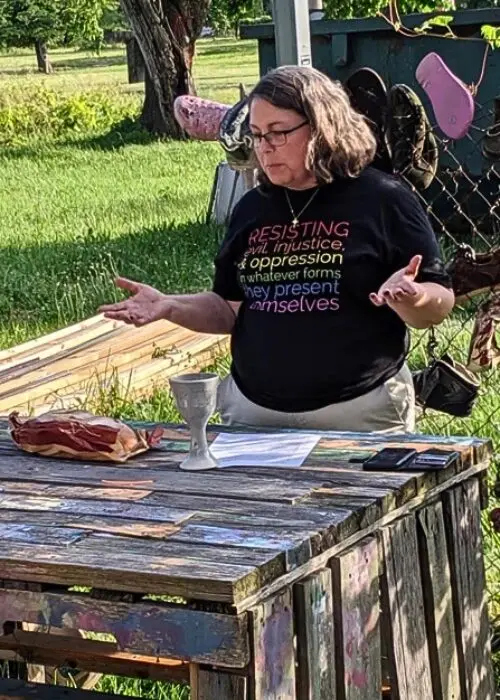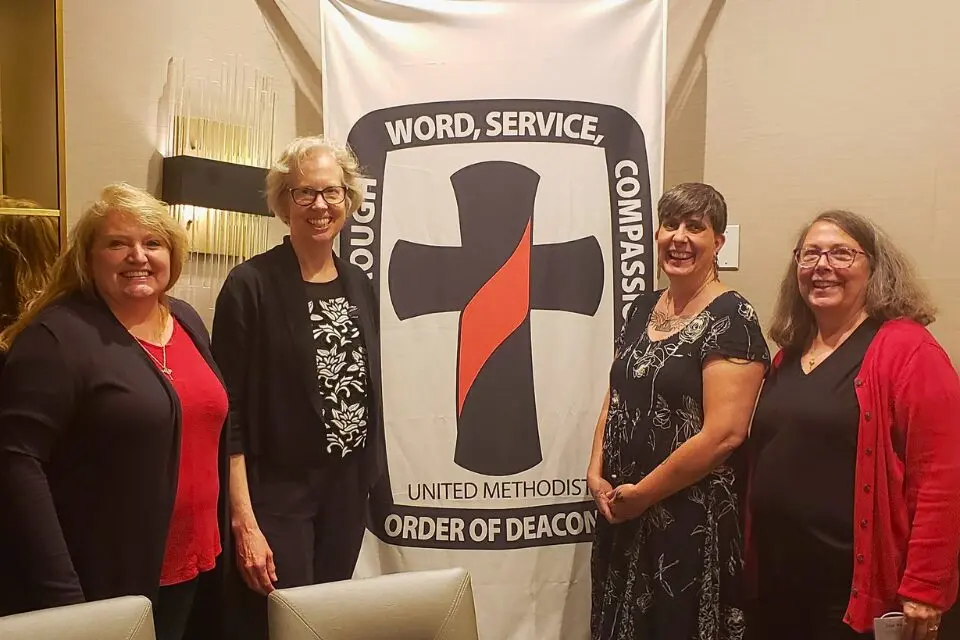Rev. Sue Pethoud reviews the passing of significant General Conference legislation impacting how deacons serve the church.
REV. SUE PETHOUD
Chair of the Order of Deacons, Michigan Conference
I have never paid attention to General Conference so intently. Focused on the “three R’s” — regionalization, the elimination of restrictive language against LGBTQ people, and the Revised Social Principles — I watched from afar with bated breath. But that wasn’t all. The deacons of The United Methodist Church also watched other things with great interest.
Four pieces of legislation that would affect the ministry of deacons were up for consideration. Three of them are fairly insignificant but make sense in their vocation and how United Methodist deacons are perceived in the world.

The first one is straightforward. Deacons should take a preaching class. I personally have encouraged this since my time in seminary. It wasn’t always required depending on one’s degree, but it should be. Though I had and still have great preachers as examples, not everyone does, and education in preparing and delivering a sermon makes sense. It will now be a requirement.
The second looks at how deacons appointed to serve outside the local church will be connected to the larger church. Currently, those deacons are required to have a secondary appointment to a local church, with some churches expecting those deacons to work as unpaid staff. The new language requires an affiliation to a charge conference, much like elders in extension ministry. That affiliation can be at whatever level is comfortable for the deacon and the church. This should clarify both the expectations and the evaluation process of those deacons and put both elders and deacons serving outside a church setting on the same plane.
The third refers to the title of “pastor.” Though many ignored the sentence in our polity that gave that title to elders and not deacons, it was a sticking point for some. In many other denominations, deacons are not ordained. They are basically faithful church people who have been given specific roles within their local church. As a result, the term “deacon” is not always understood in other denominations as it is intended in The United Methodist Church. This change in language will allow deacons to be referred to as “pastors” and should clarify our role both inside and outside the walls of the church.
The last and most significant piece of legislation addresses sacramental privilege. Previously, deacons were allowed to assist elders in administering the sacraments and could do that on their own with their bishop’s express permission. In Michigan, Bishop David Bard is very open to granting permission when the situation makes sense. In fact, the letter I have that gives me very limited permission states precisely that. However, not all bishops have the same mindset.
The Book of Discipline will now state that deacons can assist elders in administering the sacraments of baptism and communion or in presiding at the celebration of the sacraments when contextually appropriate. Authorization is no longer required. It will go on to say, “For the sake of extending the mission and ministry of the church and offering the means of grace to the world, the deacon is authorized to preside at the celebration of the sacraments.”
It’s a big deal. Deacons in The United Methodist Church are ordained clergy. They have gone through the same rigorous credentialing process as their elder counterparts. Their call is different, often putting them in the world and ministering to people in an untraditional setting. Licensed local pastors are not ordained. Though they are required to take a litany of classes over time, the process is much less rigorous. Licensed local pastors have always had sacramental authority within their ministry settings, and deacons have had next to none.
For many deacons, especially those appointed to ministries outside the walls of a church, this change feels like full inclusion. We can now offer the means of grace through the sacraments to those we encounter within our specific ministries without having to beg for permission. It is automatic. And if we are in a church setting, we also have that responsibility there when appropriate.
The Facebook page dedicated to United Methodist deacons exploded with celebratory posts soon after the vote passed 448-240 with a 65% majority. And on May 5, the first Sunday of the month, when many United Methodist churches celebrate communion, it exploded again with pictures and posts of deacons who had been asked to preside at the table by their pastors who couldn’t wait for January 1, 2025, when the polity changes go into effect.
In my ministry context, I have authorization to preside over communion with volunteer groups that come to Cass Community Social Services for their mission experiences. But there are caveats: An elder cannot be traveling with them, and they must request it. How many youth leaders would even think of asking? Now, I will be able to offer. For me, that is a huge difference. After a week of working in mission, I can offer communion as part of their reflections on their week.
This change brings some questions: What does “contextually appropriate” mean? Do I have to preside over the sacraments? One United Methodist deacon asked, “Can I still be a deacon if I don’t want this?” As time goes on, all of that will be clarified, and yes, that deacon can still be a deacon. But for now, it is enough to know that I can fully celebrate the sacraments in settings that I deem “contextually appropriate” without having to ask permission, and that feels good and right.
Last Updated on May 21, 2024

